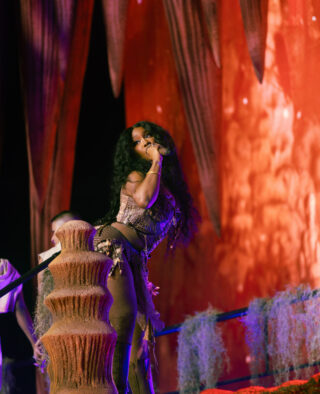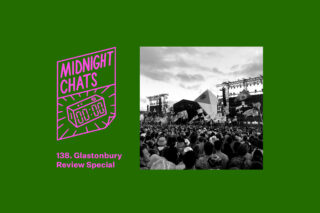Why the low turnout at SZA’s Pyramid Stage set is certainly not on her, and not on Glastonbury either
SZA at Glastonbury gives us a chance to be straight about the realities of representation, and acknowledge what it will take to make real change

SZA at Glastonbury gives us a chance to be straight about the realities of representation, and acknowledge what it will take to make real change
Photography by Cassidy Meyers
When SZA’s headlining Glastonbury performance drew a noticeably small-than-usual crowd two nights ago, the blame was first put on her: she wasn’t a “big enough” artist to headline Glastonbury, despite being one of the biggest streamers in the world (70.5 million monthly listeners on Spotify); not high-energy enough to hold a big crowd’s attention, even though she’d done so a week earlier in London at a sold out Hyde Park show; not accomplished enough, perhaps, regardless of her 4 Grammy’s and her Oscar and Golden Globe nominations. Some then started to defend SZA not on her own merits as a world class R&B star but by blaming Glastonbury for booking her. It was Glastonbury’s falt – they should have seen this coming, which, considering the hard facts about how popular SZA is, translates to, they should know their audience. And that’s where the SZA/Glastonbury discourse has the ability to open up a more useful conversation, and allow those who can affect representation in music to be straight about the challenges of doing so, and ask fans to meet them halfway.
Talk of greater representation in music (particularly of black artists) had its heyday for an impassioned but fleeting month or so in 2020 following the murder of George Floyd in Minneapolis and the rise of support in the Black Lives Matter movement. We all posted black squares and vowed to do better – those of us with platforms, and those of us who engage with them. If SZA’s performance had been closer to that time, the reactions to it would no doubt be very different to what they’ve been over the last 24 hours.
I imagine Emily Eavis would have been fully aware of how ‘un Glastonbury’ an artist like SZA is, despite her obvious global audience. So her options would have been to a.) Book a Rod Stewart instead, or b.) Make a move that might, in time, allow for SZA to become ‘a Glastonbury artist’ – like when she booked Jay-Z in 2008, and ushered in a new era of hip-hop belonging at the festival, despite many traditionalists objecting at the time. Not only would option A have been regressive in the long term (and may have involved actual Rod Stewart), it would have attracted a different, more damning criticism: that Glastonbury of all places – our utopian bubble of inclusivity – is no better than the Reading and Leeds Festival that we love to hammer when they book Blink 182 and other men-only headliners to remain on brand, insisting it’s the only way to ensure ticket sales and cover their growing costs. In fact, Glastonbury would be worse, as it’s the only festival that sells out before any acts are even announced, and so has the ultimate freedom of being able to disregard which band of dudes will fill up the site. Isn’t Glastonbury – idealistically and literally – the one festival that can take lineup risks essentially risk-free? And if we’re going to blame Glastonbury for miss-booking SZA, do we not have to at least consider Reading and Leeds’ defence in why they book who they do?

We think about this stuff a lot at Loud And Quiet, which is what compelled me to write this post. The eternal question: how do you give your audience what they want with one hand, and what you hope they might want with the other, all while keeping your ethics in check and trying to keep the lights on (the hardest part of all)? Glastonbury and Reading and Leeds are a little bit bigger than us, but I imagine it’s essentially the same for them, perhaps with a question mark or two hanging over the elasticity of ethics when the bills need to be paid. But I can still sympathise. We see it as plain as day – the reaction and sales of a copy of the magazine featuring Squid or Sleaford Mods or Black Midi on the cover versus Little Simz or Killer Mike or Denzel Curry are startling. Despite their huge successes and far greater audiences, the plain truth is that our readership seemingly doesn’t want to read about the black rappers we love as much as the white bands we love. It would be good business for us to simply double down on what sells. The problem with that, of course – not for a second forgetting L&Q’s very small part in the play – is that nothing will change in terms of greater representation of black artists, brown artists, female artists, queer artists, and trans artists, and – on a lesser note – we’d soon grow tired of making a magazine that is solely about one genre of music.
And just like that we’re staring into a black hole of a ginormous problem, which reaches farther and farther back, to education and opportunities in the arts, and class and resources and something a mercurial as taste, and how that is shaped by the aforementioned, but also how it is shaped by representation. And suddenly it’s not a black hole but a full circle. And whatever it is is massive and complex and too overwhelming to think about fixing right now, so let’s have another go at it next year when Reading and Leeds exclusively book male headliners. But when that time comes around, let’s try to remember SZA at Glastonbury, because it really is the greater alternative. As music fans we can’t have it both ways, and if we really do want fairer representation and more musical diversity at our festivals and within music, we need to put the work in too.